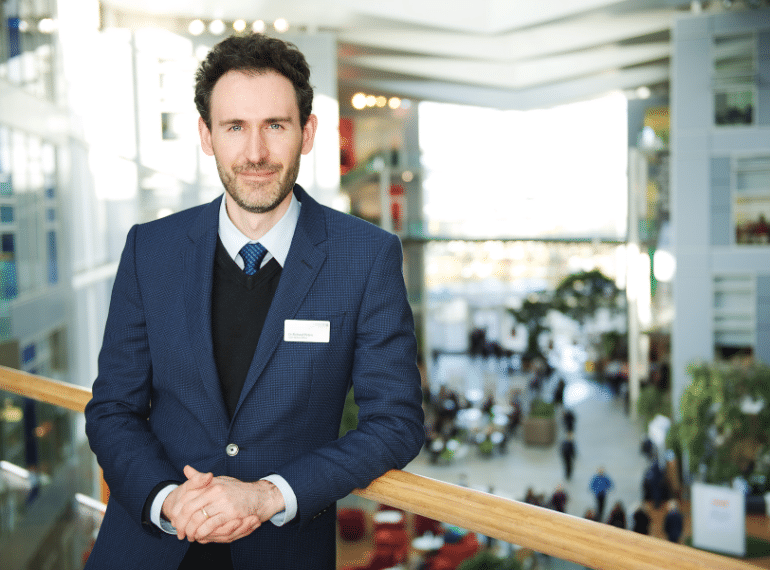
Richard Peters took a degree in Music and then months later embarked on another in Medicine – after receiving some essential help from QE in the interim.
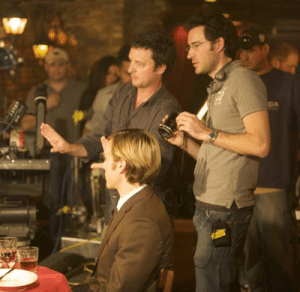 He then successfully trained as a doctor – albeit punctuated by a two-year spell in America pursuing his passion for making film and TV programmes – and later began a career specialising in occupational medicine.
He then successfully trained as a doctor – albeit punctuated by a two-year spell in America pursuing his passion for making film and TV programmes – and later began a career specialising in occupational medicine.
Today, Dr Richard Peters is Regional Medical Director at Goldman Sachs Inc, where he provides strategic medical, health and wellbeing guidance and oversight for staff based across Europe, Middle East and Africa (EMEA).
Richard’s time at QE in the late 1990s was relatively brief: he did not arrive until he was 14 and he completed some of his A-level studies elsewhere, since the School at that time was unable to offer the combination of courses he wanted to follow.
Yet he has nothing but praise for the support Headmaster Dr John Marincowitz offered him when he approached him after he completed his Music degree at Birmingham in the summer of 2002. Richard wanted to go to King’s College London the same year to read Medicine, and Dr Marincowitz readily agreed to meet him to discuss the matter.
“I talked to him, and within a week he had helped me complete my UCAS application. That is the important thing about a school like QE Boys: if you change your career path, they are more than happy to help you to support your ambitions in any way, whether that’s supporting your UCAS application or writing references.”
It had been a similar story when he had joined the School, he recalls: his family had been living in the US and he went straight into the GCSE years. His coming to the School at such a time could easily have been regarded as a problem, yet there was no sense of that at all, and he quickly found common cause with those who shared his love for music.
“When I joined, everyone was so welcoming. Having that support, both from the teachers and fellow pupils, allowed me to settle in quickly, as well as find a home in the QE music family. It has been great to see the focus QE has given to music over the years, with the opening of another music block”.
Richard, whose instruments are flute and piano, threw himself into School life, playing with both the School Orchestra and Concert Band, and eventually becoming House Captain for Pearce. He was among the first users of the then-new Music block (now superseded by The Friends’ Recital Hall and Music Rooms) and he also has happy memories of developing film in the School darkroom for his GCSE Photography.
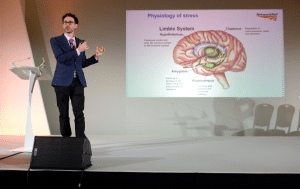 He already had a nascent interest in matters medical, wanting at that stage to become a dentist, yet decided to study Music to degree level, taking his Music Performance AS in Year 12 before leaving QE to complete his A-levels and then in 1999 going to Birmingham’s acclaimed Music department, where Edward Elgar had first held the Chair.
He already had a nascent interest in matters medical, wanting at that stage to become a dentist, yet decided to study Music to degree level, taking his Music Performance AS in Year 12 before leaving QE to complete his A-levels and then in 1999 going to Birmingham’s acclaimed Music department, where Edward Elgar had first held the Chair.
After completing his medical degree at King’s in 2007, he had a variety of roles in the NHS as part of his training. In 2011, he was appointed an Occupational Health Physician at London’s Royal Free Hospital. He then worked in occupational health for Health Management and AXA PPP Healthcare, before becoming Chief Medical Officer in Capita’s Personal Independence Payment team. This role allowed him to gain strategic commercial health experience, which facilitated his move to become Chief Medical and Wellbeing Officer for Network Rail in February 2017. In March 2022, he joined Goldman Sachs, to gain more international experience.
“I love my job, as I support organisations to find ways to improve the health and wellbeing of their employees, as well as facilitating improvements in the way health services are delivered. I enjoy the diversity of the role, being able to speak with colleagues across the globe, whether it be India and Asia in the morning, followed by the Americas in the afternoon. Occupational Medicine is such a varied speciality as it allows a mix of clinical and strategic medicine. You could be consulting with patients in the morning, to designing a global mental health strategy and advising a business on COVID related outcomes by the afternoon.”
Outside of his day job, he is an Honorary Clinical Associate Professor at UCL Medical School, where he teaches Occupational Medicine to the medical students. He is also Chair of the Faculty of Occupational Medicine Medical School Steering Group, which has the fundamental aim of raising awarness of the speciality amongst medical students and junior doctors.
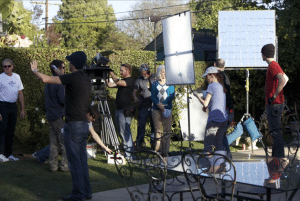 He retains the enthusiasm that drove him a decade ago to spend two years in Los Angeles making films and working on TV shows. “While I don’t have much spare time, I did manage to combine medicine and media – two of my passions! – when I produced and co-wrote a first-aid training film for Network Rail: it was a fictional drama to raise awareness of the importance of first-aiders for saving lives.”
He retains the enthusiasm that drove him a decade ago to spend two years in Los Angeles making films and working on TV shows. “While I don’t have much spare time, I did manage to combine medicine and media – two of my passions! – when I produced and co-wrote a first-aid training film for Network Rail: it was a fictional drama to raise awareness of the importance of first-aiders for saving lives.”
Richard stays in contact with a number of other OEs, mostly by social media, although meeting up does prove difficult with all their busy schedules.

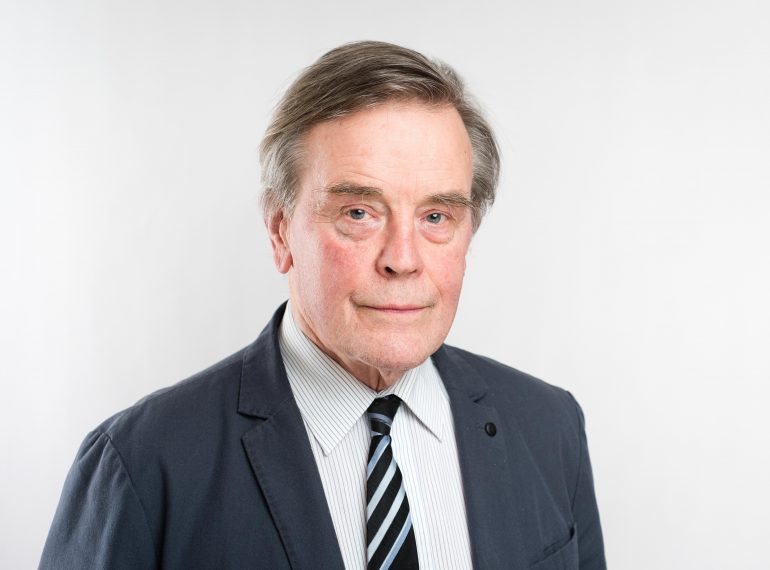
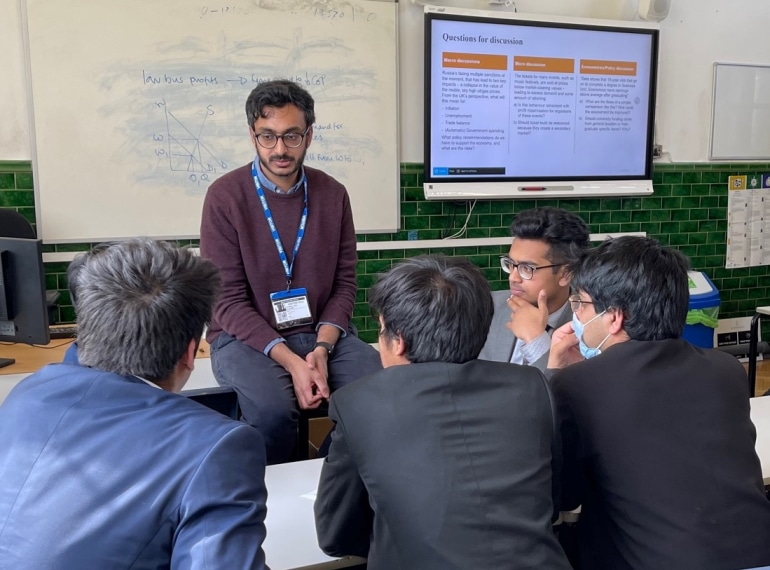
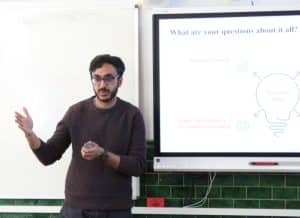 Zainul Jafferji, who took a Master’s in Economics (MPhil) at Cambridge, visited on three consecutive weeks.
Zainul Jafferji, who took a Master’s in Economics (MPhil) at Cambridge, visited on three consecutive weeks.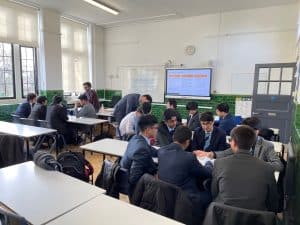 In week two, he outlined the four main career paths for Economics undergraduates: investment banking, management consulting, public policy and further study.
In week two, he outlined the four main career paths for Economics undergraduates: investment banking, management consulting, public policy and further study.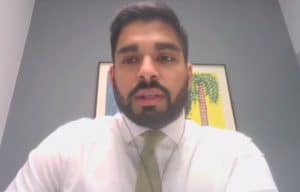 In his virtual talk, Zain, who read Philosophy, Politics and Economics (PPE) at Warwick, said boys should start at university as they meant to finish, rejecting any thoughts of “the first year doesn’t count so I will work harder in the second and third years”.
In his virtual talk, Zain, who read Philosophy, Politics and Economics (PPE) at Warwick, said boys should start at university as they meant to finish, rejecting any thoughts of “the first year doesn’t count so I will work harder in the second and third years”. In his talk, which was also delivered online, Bristol graduate Yemi related how he had switched from Medicine to Economics at university. He said frankly that his parents were keener on Medicine than he was.
In his talk, which was also delivered online, Bristol graduate Yemi related how he had switched from Medicine to Economics at university. He said frankly that his parents were keener on Medicine than he was.
 His dessert, a dark chocolate pavé topped with a pistachio dust and crystallised pistachios with a cardamon shortbread biscuit, saffron caramel and a cardamom crumb, was described by the celebrity chef as “professional level”.
His dessert, a dark chocolate pavé topped with a pistachio dust and crystallised pistachios with a cardamon shortbread biscuit, saffron caramel and a cardamom crumb, was described by the celebrity chef as “professional level”. Looking back, he can see that his time at QE helped lay the platform for his current success, both in his career and in his ability to cope with the intense demands of the show. “I think the pressure of School did set me up for future pressure – in a good way! It was a lot of hard work and I got used to working hard and working independently.
Looking back, he can see that his time at QE helped lay the platform for his current success, both in his career and in his ability to cope with the intense demands of the show. “I think the pressure of School did set me up for future pressure – in a good way! It was a lot of hard work and I got used to working hard and working independently.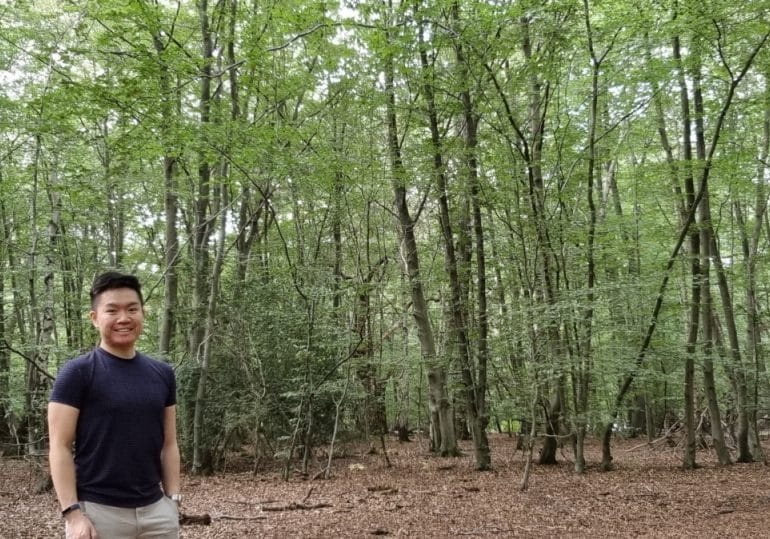
 A way forward came in the shape of a part-time job with Apple, where he started as a humble shop floor assistant (a ‘Specialist’) at an Apple Store, before progressing to become an ‘iOS Champion’ –- “basically anything to do with iPads, iPhones etc.” –- and then being offered the opportunity to deliver workshops, in addition to his iOS Champion role. (He is pictured, circled centre, on his first day.)
A way forward came in the shape of a part-time job with Apple, where he started as a humble shop floor assistant (a ‘Specialist’) at an Apple Store, before progressing to become an ‘iOS Champion’ –- “basically anything to do with iPads, iPhones etc.” –- and then being offered the opportunity to deliver workshops, in addition to his iOS Champion role. (He is pictured, circled centre, on his first day.) Juggling everything was not easy and, as Barry admits, in the run-up to his finals, his studies suffered: “I’d either be working, or applying to every single technology consulting firm graduate opportunity that I could find. I found that job applications were extremely time-consuming, especially if you want to tailor each application to each company.”
Juggling everything was not easy and, as Barry admits, in the run-up to his finals, his studies suffered: “I’d either be working, or applying to every single technology consulting firm graduate opportunity that I could find. I found that job applications were extremely time-consuming, especially if you want to tailor each application to each company.”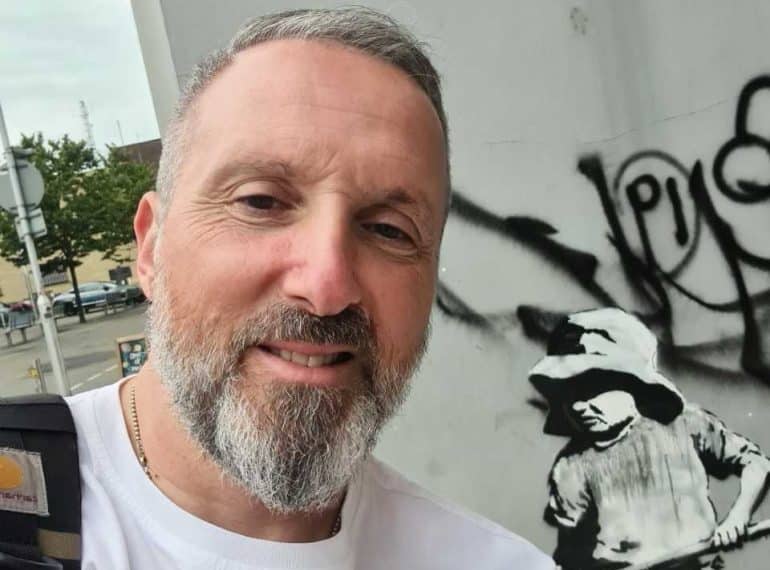
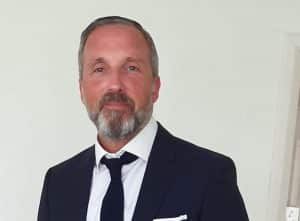 After leaving the University of Greenwich with a degree in Real Estate, Warren (OE 1986–1988) worked in the 1990s as a Planner Buyer for industry giant MediaCom.
After leaving the University of Greenwich with a degree in Real Estate, Warren (OE 1986–1988) worked in the 1990s as a Planner Buyer for industry giant MediaCom.